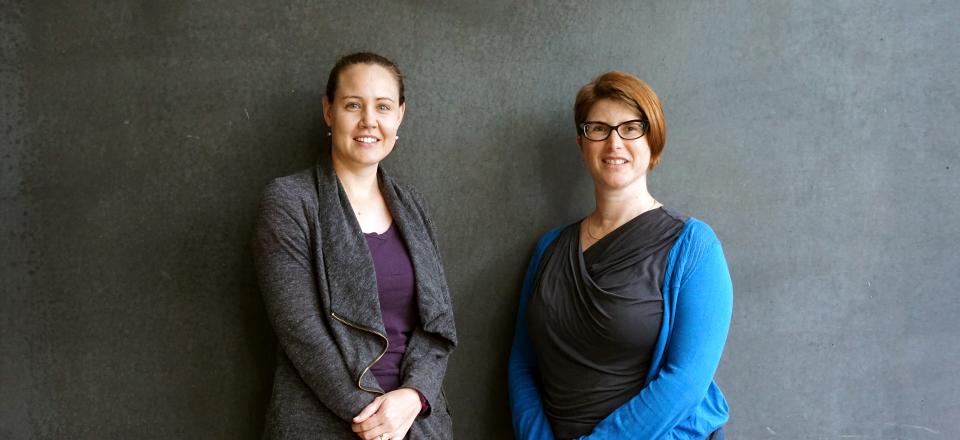ASBMB recognises Bio21 early to mid-career researchers and teaching staff

From recognising innovation in teaching initiatives to supporting mid-career researchers to attend international conferences, three members of the Bio21 community and the University of Melbourne’s Department of Biochemistry and Molecular Biology, Dr Natalie Spillman (Eppendorf Edman Award), Dr Heather Verkade (Shimadzu Education Award) and Yi Lin Kang (ASBMB Fellowship) have been awarded ASBMB awards.
Dr Natalie Spillman was notified that she had been awarded the ASBMB Eppendorf Edman Award just in time to register for an international conference on lipids she hoped to attend: “I received the news on Friday and the deadline for the conference registration was Sunday,” recalls Natalie Spillman, a postdoc in the Tilley lab, who conducts research on malaria resistance to the drug artemisinin and the role of lipid signalling in the malaria pathology. “I’m very excited,” she says.
The Eppendorf Edman Award is awarded to a biochemist or molecular biologist with no more than 7 years postdoctoral experience, in recognition of their outstanding research work. The Award provides funds to assist the recipient to attend an overseas conference in a field associated with biochemistry or molecular biology.
Natalie Spillman, who completed her PhD at ANU, arrived at the Bio21 Institute in November 2016 after a four year ‘postdoc’ in Dan Goldberg’s malaria group in Saint Louis, Missouri. Here she specialised in studying lipid signalling. Natalie’s research focussed on how the malaria parasite alters lipid signalling of the red blood cells. One lipid class, the epoxyeicosatrienoic acids (EETs), are present in particularly high concentrations within red blood cells. As red blood cells encounter sheer forces in a constricted blood vessel, EET signalling allows the vessel to expand. However, the malaria parasite degrades EETs and as a result the blood vessel constriction may no longer be so well regulated. This works to the malaria’s advantage, as when the signal is disrupted, blood vessels also receive an inflammatory signal, causing them to become ‘stickier’ and for infected red blood cells to adhere to them, thereby retaining the parasites in the bloodstream.
“This ASBMB early-mid career researcher award will allow me to attend the “Molecular and Cell Biology of Membranes” conference at EMBL, Heidelberg, Germany this May” explains Natalie.
At the EMBL conference, Natalie hopes to learn about new tools and advances in the field of lipid research that she can apply to her work on malaria.
---
A classic mistake that molecular biology students make in their Honours year is to order primers that won’t work. It’s based on a misconception about the directionality of DNA from the 5’ to 3’. “They may get the answer right in a multiple choice test, but when it comes to applying their knowledge they’ve forgotten this fundamental concept of DNA structure,” explains Dr Heather Verkade, a senior lecturer in Molecular Biology and Biochemistry.
Dr Heather Verkade has been awarded the ASBMB Shimadzu Education award, which rewards outstanding achievement in education in biochemistry or molecular biology, especially innovation and creativity in education, with a view to fostering leadership in this important area of the Society’s objectives.
A passionate teacher, Heather Verkade confronts these misconceptions in her lectures. “We ask students to apply their knowledge; let them make the mistake and through thinking it through and discussing it with their peers, to then truly understand the concept,” she explains. “It’s something that bothered me when I was a lecturer at Monash and saw the exam answers, so I started reading the literature to see how others had endeavoured to fix these misconceptions.”
Heather uses this technique of ‘active learning’ in her lectures and it is also a focus of her educational research in collaboration with the Melbourne Centre for the Study of Higher Education.
Heather gained a teaching and research academic position at Monash University in the School of Biological Sciences, but realised that she was most fascinated with university education and the complex processes by which students learn. In 2014, she was fortunate to gain a Teaching Specialist position as a Senior Lecturer at the University of Melbourne in the Department of Biochemistry and Molecular Biology.
The Award will allow Heather to attend the American Society for Microbiology Conference on Undergraduate Education, in Denver CO to present my work on active learning and misconceptions .
Heather’s application was supported by Associate Professor Susan Rowland from University of Queensland, Professor Janet Macauley from Monash and Professor David Williams from the University of Melbourne. “It’s great to get the award, and great to receive this recognition from the ASBMB, as it shows a recognition of the importance of education to the scientific societies.”
Yi Lin Kang, a PhD student in the Stojanovski group at the Bio21 Institute, was one of four recipients to be awarded an ASBMB Fellowship. The Fellowships are awarded annually to biochemists or molecular biologists, each of whom is at least in the second year of PhD training, in recognition of their outstanding work in the field of biochemistry or molecular biology.
The fellowships provide funds to assist each recipient to attend an overseas conference in a field associated with biochemistry or molecular biology.

